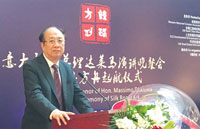Technological innovation is strategic imperative
Updated: 2016-05-28 09:12
By Hu Changshuan(China Dailly)
|
|||||||||
Xi has also pointed out that currently technology's contribution to the country's economic growth is much lower than it is in developed countries. That is why he has emphasized that technological innovation is of strategic importance and without modern technology the rejuvenation of the nation will be impossible.
A global vision is also a characteristic of Xi's strategic thinking. He noted that in order to enhance technological innovation China must learn from developed countries, instead of hiding itself behind closed doors. Of course, China must also cultivate its own intellectual property and invest more in R&D because you cannot learn everything by copying.
Xi's thinking is very practical, and he knows clearly that China's technological innovation ability still lags far behind that of developed countries.
China is a giant in manufacturing, but it is not a technological power yet; even though four of the global top 10 internet enterprises are located in China, they still rely heavily on developed countries for their core technologies.
For example, smartphones made in China now account for 80 percent of the domestic market, but they use chips and displays imported from overseas, and pay overseas enterprises high fees for the right to use their intellectual property. For every iPhone which is assembled in China, Chinese plants are allocated just 1.8 percent of the total value chain, while the majority goes to US technology enterprises and the US GDP.
Xi's purpose is to turn from being a "follower" to being a "leader". He hopes that domestic researchers and scientists will make breakthroughs in key technologies and open up new frontiers, and has pointed out that only when we hold the core technologies can we protect our security.
The author is a professor on technology philosophy at Central Compilation Bureau.
Related Stories
Chinese company launches innovation ecosystem 2016-05-27 14:01
International exposition focuses on innovation 2016-05-27 07:40
Innovation may play key G20 role 2016-05-27 07:36
Startup Village brings global investors and entrepreneurs to Skolkovo Innovation Center 2016-05-26 11:06
Chinese premier stresses reform, innovation 2016-05-25 00:19
Zone points way for innovation 2016-05-24 08:21
Today's Top News
Rescue vessel eyed for the Nansha Islands
Steeled for change
EU has to cope with outcome of British referendum
Four Chinese banks among world's 10 largest
Kiev swaps Russian detainees for Ukraine's Savchenko
Refugees relocated during major police operation
China calls for concerted anti-terror efforts
London's financial centre warns of dangers of Brexit
Hot Topics
Lunar probe , China growth forecasts, Emission rules get tougher, China seen through 'colored lens', International board,
Editor's Picks

|

|

|

|

|

|







